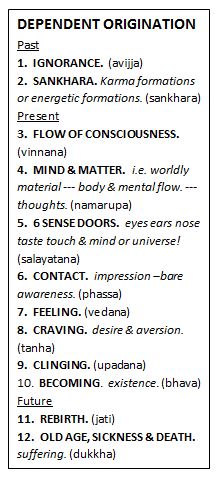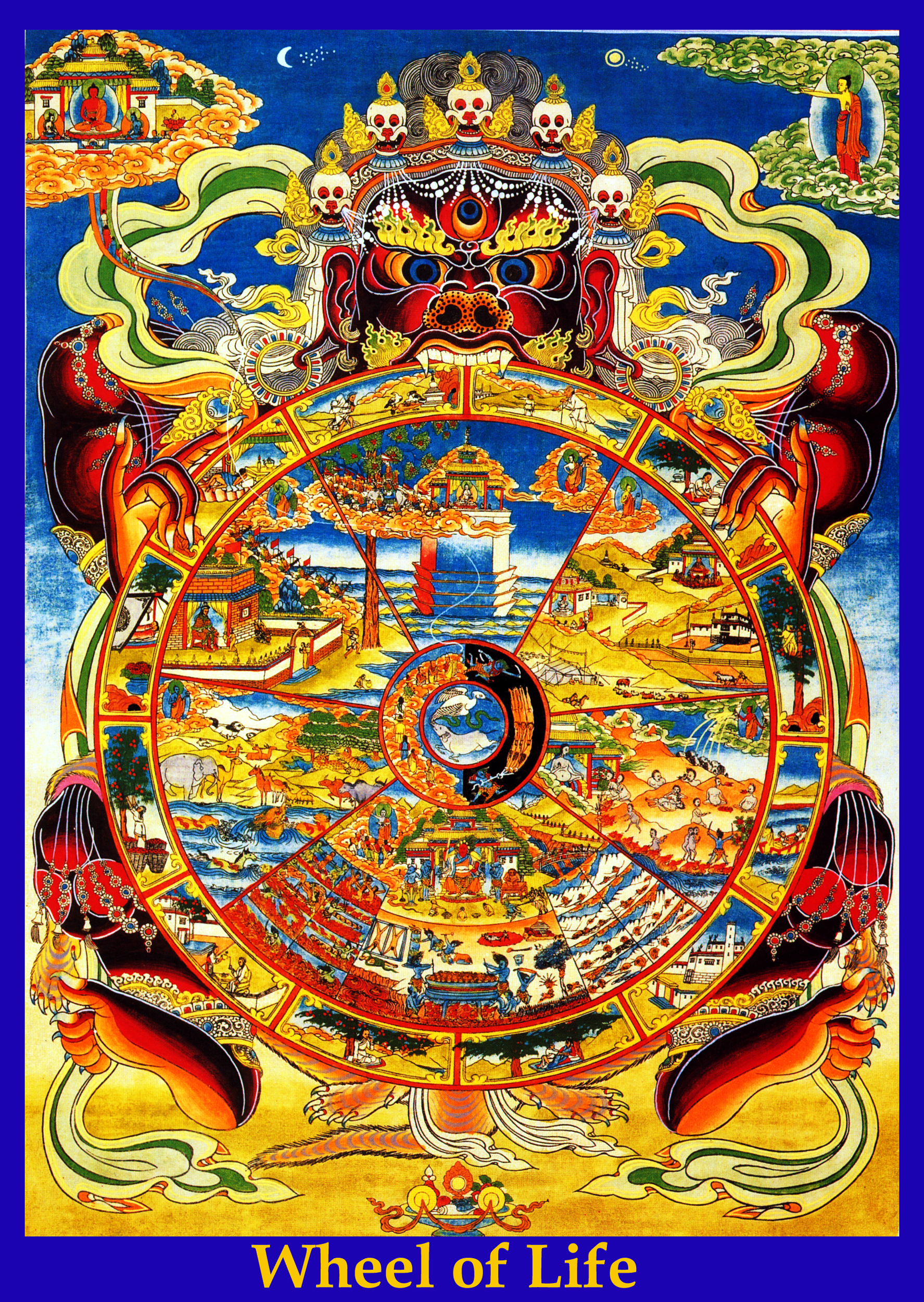Buddhism & No Self (Anatta).
Tuesday 24 Jan 2017
The concept of Anatta or no self in Buddhism can be quite daunting for some of us to approach. I am writing this blog following a discussion that implored me to find another word instead of “finished” when speaking of a life that has ended in Nibbana. Words can be an impediment! Anatta means literally no-self. It is saying that the self that we think about as me is not at its heart real. Further, it is saying that even the idea of a permanent soul is not real. Views like this can be scary and even be an obstruction to meditation practice, because when you start to come across the deeper stillness of the mind it can literally make us scared to continue for fear of annihilating our self. (“See my series of poems around fear in the moment”)

The differing ways that we interact with and then hold onto our consciousness is the basis of what can be understood as our Karma. Most of this is created subconsciously or even unconsciously! Meditation and the uncovering of the still consciousness in the heart of the present moment is what will give us a truthful perspective and when coupled with mindfulness allows us to view our conscious stream with progressive clarity. The baseline energy of stillness becomes our bench mark or datum and we know it is right because it comes straight out of the present moment as a continuous regenerating platform to see from.
What we see as we look out into the external world is what is apparent. Our day to day lives perhaps hum drum, perhaps challenging or blissful, exciting or scary. The movement of our consciousness shifts to bring us a perception and then a feeling as the world we are interacting with arises and passes away each moment. We grasp and hold on to what our karma and conditioning allows and dictates to us, just the same as it does for all that inhabit the world --- be it Animal Mineral or Vegetable. This includes all beings from godly to angelically ethereal through to the demonic. I will include an image of the “Buddhist Wheel of Life” which shows the cosmology I am describing. It is all being held in place by the mythical figure Yama, a who works to keeps us all ignorant of impermanence.
 So from a Buddhist perspective, ignorance is at the core of our lives. It keeps us on the wheel of Samsara, living and dying only to be reborn again as we grasp at our stream of consciousness, which over our lifetime, has been well and truly conditioned into the conscious field of the universe. This conditioning is always ready to provide a scaffold for a new life depending on how our karma plays out at death. This is a very natural but complicated process; however the stream of consciousness is continuous from one life to the next. Because of our ignorance, Karma keeps our conditioning in place unconsciously as we continue to hold on. We can see the resonance of this process if we observe moment to moment, day to day, year to year and then of course life to life.
So from a Buddhist perspective, ignorance is at the core of our lives. It keeps us on the wheel of Samsara, living and dying only to be reborn again as we grasp at our stream of consciousness, which over our lifetime, has been well and truly conditioned into the conscious field of the universe. This conditioning is always ready to provide a scaffold for a new life depending on how our karma plays out at death. This is a very natural but complicated process; however the stream of consciousness is continuous from one life to the next. Because of our ignorance, Karma keeps our conditioning in place unconsciously as we continue to hold on. We can see the resonance of this process if we observe moment to moment, day to day, year to year and then of course life to life.
Whichever way we look at life it is a mystery. Consciousness is a mystery! When asked about where consciousness or the Universe began, the Buddha using his powerfully developed mind said “he had looked back over 24 Universal Cycles and no beginning could be seen”. In a way this is a perfect dualistic complement to the Christian idea of everlasting life. The Buddha’s genius was in understanding that absolute truth is not “out there”, it lies in this present moment right here and now. His meditation practice allowed him to still his mind to a point where he was able to stop. Instead of looking out through his metaphorical telescope to the external world with all its complexity he looked back into his own mind and practiced simply to make it stop. This is where he found the right perspective to understand Samsara. The stillness he uncovered allowed him to see the apparent and the transcendent in each moment. He realised that consciousness is a condition that has a dependent arising. As such it has the propensity to finish!
With his enlightenment under the Bodhi tree Siddhartha Gotima became the Buddha. He had entered into the realm of Para-Nibbana. A bit like a waiting room for complete unification at death! He had become one with the Universe. The Universe had unified with his mind stream! For him there was no longer an external world. He knew that when his body died, his mind stream would finish and he would not be reborn. He would be complete in the balance of Nibbana
The Buddha has shown that the concept of Anatta is a beautiful thing. What a blessing to know that there is true peace and freedom from conditioning to be realised in the reality of Nibbana. The fact that life on Samsara’s wheel can finish is a good thing. It is something to be praised, not feared. It is the finish of Dukkha that leaves only freedom.
The Buddha did not praise or recommend life on Samsara’s wheel. In fact he said “the house of self is on fire, get out as soon as you can”. In his first teaching of the Four Noble Truths he said, “life is Dukka”, meaning Suffering. He said true peace could never be found on Samsara’s wheel. Another of the most compelling reasons the Buddha gave to have us strive for Nibbana is that we can presume it is much harder to realise this truth in other realms of existence. Observe the life of birds or animals! Instinctual living and or life in a jungle can be difficult. Life in heavenly realms may be more to our taste but eventually it palls and even though it may be long, it is still impermanent and subject to death and rebirth. Self-reflection and an inclination to practice Dhamma would be limited in both cases! Our life and death is capricious enough. We could easily be born into a realm where realisation of the Dharma is impossible. However here right now, in this human realm, there is generally enough balance in our dualistic life to know both happiness and suffering, to understand Dukka and to understand the Buddha’s teachings.
The truth of Anatta is joy to be realised. Understanding our good fortune and our good karma to be presented with the Dhamma and then to have the opportunity to practice and incline towards peace renders us as being truly blessed. This is our opportunity to be free. This is the pathway to freedom.






